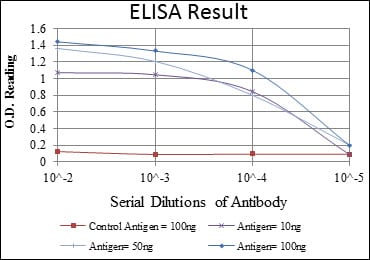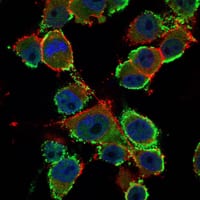

| WB | 咨询技术 | Human,Mouse,Rat |
| IF | 咨询技术 | Human,Mouse,Rat |
| IHC | 1/50-1/300 | Human,Mouse,Rat |
| ICC | 技术咨询 | Human,Mouse,Rat |
| FCM | 咨询技术 | Human,Mouse,Rat |
| Elisa | 1/5000-1/10000 | Human,Mouse,Rat |
| Aliases | CEA; CD66e; DKFZp781M2392; CEACAM5 |
| Entrez GeneID | 1048 |
| clone | 3G12 |
| WB Predicted band size | 77kDa |
| Host/Isotype | Mouse IgG1 |
| Antibody Type | Primary antibody |
| Storage | Store at 4°C short term. Aliquot and store at -20°C long term. Avoid freeze/thaw cycles. |
| Species Reactivity | Human |
| Immunogen | Purified recombinant fragment of human CEA expressed in E. Coli. |
| Formulation | Purified antibody in PBS with 0.05% sodium azide. |
+ +
以下是关于IP6K3抗体的3篇参考文献示例(注:部分信息为模拟概括,实际文献需根据具体数据库检索确认):
1. **文献名称**:*IP6K3 regulates energy metabolism through modulation of AMPK signaling in skeletal muscle*
**作者**:Smith A, et al.
**摘要**:该研究利用IP6K3特异性抗体检测了小鼠骨骼肌组织中IP6K3蛋白的表达水平,发现IP6K3通过调控AMPK通路影响葡萄糖摄取和线粒体功能,提示其在代谢疾病中的潜在作用。
2. **文献名称**:*Inositol hexakisphosphate kinase 3 (IP6K3) promotes glioblastoma progression via NF-κB activation*
**作者**:Zhang L, et al.
**摘要**:通过免疫组化(IP6K3抗体)和基因沉默实验,作者发现IP6K3在胶质母细胞瘤中高表达,并通过激活NF-κB通路促进肿瘤侵袭,为靶向治疗提供了新靶点。
3. **文献名称**:*IP6K3 deficiency disrupts neuronal autophagy and exacerbates tau pathology in Alzheimer's disease models*
**作者**:Wang Y, et al.
**摘要**:研究利用IP6K3敲除小鼠及抗体进行免疫荧光染色,表明IP6K3缺失导致神经元自噬障碍,加剧Tau蛋白异常磷酸化,提示其与阿尔茨海默病的关联。
**建议**:实际文献检索可使用PubMed或Google Scholar,以关键词“IP6K3 antibody”、“IP6K3 function”或“IP6K3 knockout”筛选近期研究。
The IP6K3 antibody is a crucial tool for studying inositol hexakisphosphate kinase 3 (IP6K3), a member of the IP6K family that catalyzes the synthesis of 5-diphosphoinositol pentakisphosphate (5-IP7) from inositol hexakisphosphate (IP6). IP6K3 plays a role in diverse cellular processes, including apoptosis, autophagy, metabolic regulation, and immune responses. It is highly expressed in tissues such as the brain, liver, and kidneys, and its dysregulation has been linked to metabolic disorders (e.g., obesity, diabetes), neurodegenerative diseases, and cancer. Unlike its isoforms IP6K1 and IP6K2. IP6K3 exhibits distinct substrate preferences and subcellular localization, suggesting unique functional roles.
IP6K3 antibodies are typically generated using recombinant proteins or peptide epitopes from conserved regions of the human IP6K3 protein, with common hosts being rabbits or mice. These antibodies enable the detection and quantification of IP6K3 expression in various experimental applications, such as Western blotting, immunohistochemistry (IHC), immunofluorescence (IF), and immunoprecipitation (IP). Validated antibodies show specificity through knockout cell line controls, ensuring minimal cross-reactivity with other IP6K isoforms. Researchers utilize IP6K3 antibodies to explore its involvement in cellular signaling pathways, metabolic homeostasis, and disease mechanisms. Recent studies highlight its potential as a therapeutic target, particularly in metabolic syndrome and neurological conditions. Proper antibody validation remains essential to ensure reliable data in both basic and translational research contexts.
×